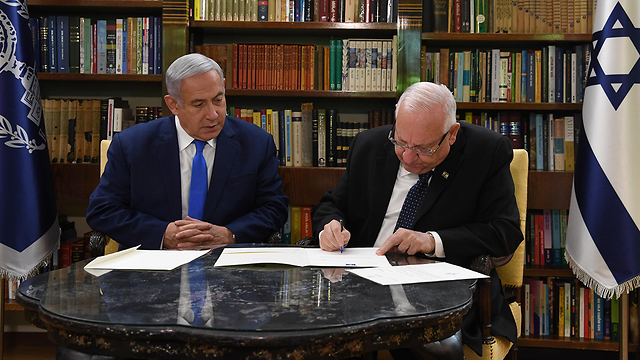
Netanyahu's legislative push is all about dodging prosecution, say critics
Among a raft of controversial new bills set to be passed by the incoming right-wing coalition is a piece of legislation that would thwart any move to bring charges against the prime minister in the three corruption investigations currently open into his activities
Prime Minister Benjamin Netanyahu and his future coalition are working on legislation that could grant him immunity from expected corruption charges. The new laws are set to revolutionize the Israeli legal system and will likely be implemented once the new government is sworn in.
While the prime minister presented the new legislation as form of strengthening governability and empowering the people, other unnamed political figures were convinced his agenda was first and foremost protecting himself from future prosecution.
Netanyahu is suspected of corruption in three separate cases. Earlier this year, Attorney General Avichai Mandelblit recommended bribery, fraud and breach of trust charges in Case 4000, in which Netanyahu is suspected of receiving favorable coverage on the Walla! News website in return for regulatory benefits to telecommunications giant Bezeq, which owned the site.
The attorney general also called for charges of fraud and breach of trust in both Case 1000, in which Netanyahu and his family are suspected of receiving illicit gifts from wealthy donors such as Israeli Hollywood producer Arnon Milchan, and Case 2000, in which Netanyahu allegedly tried to negotiate favorable coverage in the Yedioth Ahronoth daily (Ynetnews' sister publication) in return for promoting legislation against rival paper Israel Hayom.
Netanyahu means to anchor in coalition agreements the passage of two controversial pieces of legislation that the Supreme Court overruled in the previous government's term: the anti-infiltration law, aimed at facilitating the deportation of African migrants, and the expulsion bill, that will allow the deportation of the families of convicted terrorists from their homes.
The prime minister said earlier this month the Knesset's summer term will be longer than usual, to facilitate important legislation.
Political watchers suggest that Netanyahu will first work to push a bill allowing the Knesset to overturn Supreme Court rulings with just a simple majority. That will allow all other controversial legislation to push forward — particularly a law to guarantee the prime minister's immunity from prosecution while he is office.
"My policy has always been to keep the court strong and independent, but it doesn't mean that it can do whatever it wants," Netanyahu wrote in Hebrew on Facebook on Monday, and blamed the media for falsely presenting his legislation initiatives in order "to prevent changes from taking place and to create fear."
"These laws are what the public expects of us: the deportation of terrorists' families, the deportation of infiltrators, and a death penalty for terrorists," said the prime minister.
"I'm determined to fearlessly work for you, the citizens of Israel. That's why you voted for me," he said.
But an unnamed senior member of the incoming coalition said he believes that Netanyahu's legislation blitz is solely to ensure his immunity from prosecution. He said that the prime minister "is preparing the public opinion to support the dramatic changes that he'll execute once the government is sworn in."

A hearing on Netanyahu's indictments is set to take place before July 10. However, the prime minister is expected to get an extension and the hearing will be set for in September.
Netanyahu is thus racing against the clock to pass the immunity law before his hearing, and needs the Knesset to extend its summer term as much as is necessary to facilitate the legislation.
Many in the Israeli legal system say they are follow the unfolding events with trepidation, but are unable to make any comments due to the sensitive nature of their role.
Chief Justice of the Supreme Court Esther Hayut broke the policy of silence on Tuesday, warning that the independence of the legal system "one of the cornerstones of democracy."
"We are used to many years of incitement against us and our role in Israeli society, which harm the public's faith in the court," said a judge who asked not to be named. "The fact that we cannot comment on the distorted things politicians say makes us face preposterous accusations all the time."
The judge added: "Supreme Court justices are democratic patriots who put the welfare and prosperity of Israeli society first, no less than any politician. We live in the Israeli reality and understand its needs, and have no intention of taking over or intentionally dismissing decisions by the Knesset and the government."










